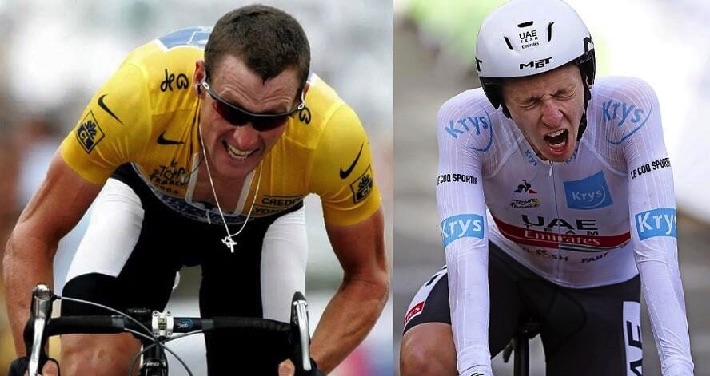
“UNBELIEVABLE SAD NEWS: Tadej Pogačar Fined in Controversial Training Session with Lance Armstrong”
In the world of competitive cycling, few names spark as much emotion and debate as Lance Armstrong and Tadej Pogačar. Armstrong, once a celebrated hero for his Tour de France victories and inspiring comeback story, became one of the most infamous figures in sports due to his admission of doping. On the other hand, Tadej Pogačar, a young cycling prodigy from Slovenia, has captured the hearts of cycling fans with his extraordinary talent and clean track record. At only 26 years old, Pogačar has already won the Tour de France twice and is hailed as one of the sport’s brightest stars. So, the recent news of a fine imposed on him due to training with Lance Armstrong has sent shockwaves throughout the cycling community.
This incident has not only shocked fans but has also raised questions about the role of mentorship, the legacies of once-disgraced athletes, and the strict codes of ethics within the cycling world.
Reports state that Pogačar was fined by cycling authorities after he was seen training with Armstrong in an undisclosed location. Though the details remain murky, it appears the fine was due to Pogačar’s association with Armstrong, a figure who remains barred from any official affiliation with professional cycling. Armstrong, having been stripped of his titles and permanently banned from competing, has nonetheless been active in the cycling world, often as a commentator, podcaster, and sometimes as an unofficial advisor to aspiring cyclists.
Pogačar’s training session with Armstrong, while informal and non-competitive, seems to have triggered penalties under regulations aimed at preserving the sport’s reputation. Authorities deemed this association inappropriate, viewing it as potentially endorsing or legitimizing a figure whose actions once brought disgrace to professional cycling.
This situation is especially sensitive due to the fact that Pogačar has made a name for himself through his clean, powerful riding, avoiding any hint of performance-enhancing drugs. The fine seems to carry a symbolic weight as the cycling community strives to uphold strict ethical standards. While there was no indication that Pogačar engaged in any wrongdoing, the mere fact of his association with Armstrong may have been enough to spark this response.
For Pogačar, the training session may have simply represented an opportunity to learn from someone with deep insights into the sport. Armstrong, despite his controversial past, is undeniably one of the most knowledgeable figures in cycling, having faced countless challenges on the road and knowing what it takes to perform at the sport’s highest level. For a young athlete like Pogačar, whose career is still blossoming, a session with Armstrong could have provided valuable advice on aspects such as race strategy, stamina management, and mental resilience.
If Pogačar was aware of the risks associated with training alongside Armstrong, it’s possible he saw the potential benefits as outweighing any reputational costs. After all, many young athletes look up to past champions, regardless of their controversies, as sources of inspiration or wisdom. However, Pogačar’s situation highlights the fine line athletes walk in choosing their mentors—especially those who carry complicated legacies.
Reactions to Pogačar’s fine have been mixed. Many fans argue that he should have the freedom to train with whomever he chooses, regardless of the individual’s past mistakes. They see Pogačar’s relationship with Armstrong as purely educational, and they argue that it should not affect his standing in the sport. Some even suggest that Armstrong’s insight, while tarnished by scandal, is nonetheless grounded in a wealth of real-world experience that could be valuable to young racers.
Others, however, support the fine, believing that Pogačar’s association with Armstrong undermines the integrity of cycling, which has worked hard to distance itself from its doping-riddled past. For these fans and stakeholders, the fine is a necessary step in maintaining the sport’s commitment to transparency and clean competition.
Prominent figures within the sport have voiced opinions on the incident as well. Some have defended Pogačar’s decision, highlighting the importance of mentorship and learning. Others warn that associating with Armstrong sends a dangerous message to fans and fellow cyclists alike, potentially reopening wounds from the dark days of doping scandals.
Armstrong’s legacy remains a contentious issue. His rise and fall as a cycling hero has been one of the most publicized scandals in sports history. Despite his success and resilience, Armstrong’s name is permanently linked with deception. However, he still holds influence over young cyclists who see value in his expertise.
While Armstrong’s legacy is tainted, some believe that he has made positive contributions to cycling in a post-scandal capacity, offering guidance and advice on training and endurance. But due to his lifetime ban, any formal connection with him is strictly forbidden by professional cycling organizations. For them, Armstrong represents a painful era that cycling is trying to leave behind.
The fine may only be a minor setback for Pogačar, who has otherwise maintained a spotless reputation. However, this incident could serve as a reminder of the scrutiny that top athletes face, and the complicated nature of legacy in sports. For a cyclist like Pogačar, who has the potential to be remembered as one of the greats, the choice of mentors is more than a personal decision; it’s one that carries symbolic weight.
In the end, this story underscores the challenges that athletes face in balancing personal growth with public perception. It also raises broader questions about how sports treat controversial figures, and whether redemption is truly attainable in the eyes of the public. For Pogačar, the road ahead is still open and full of potential. This episode, though perhaps troubling, will likely be a stepping stone in his development as both an athlete and a person.
Leave a Reply